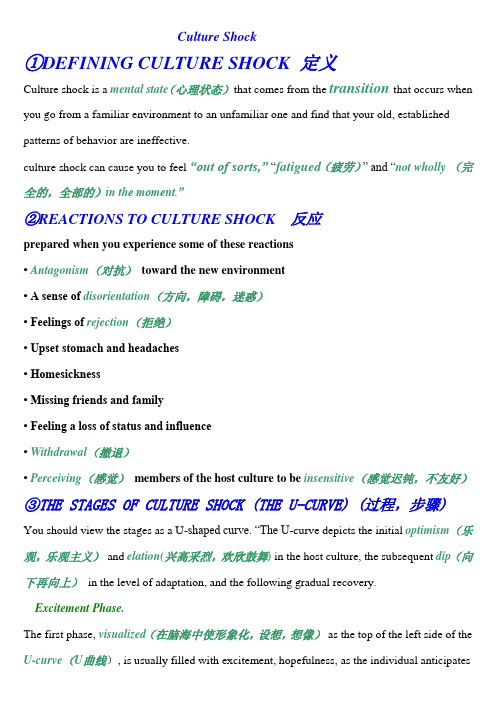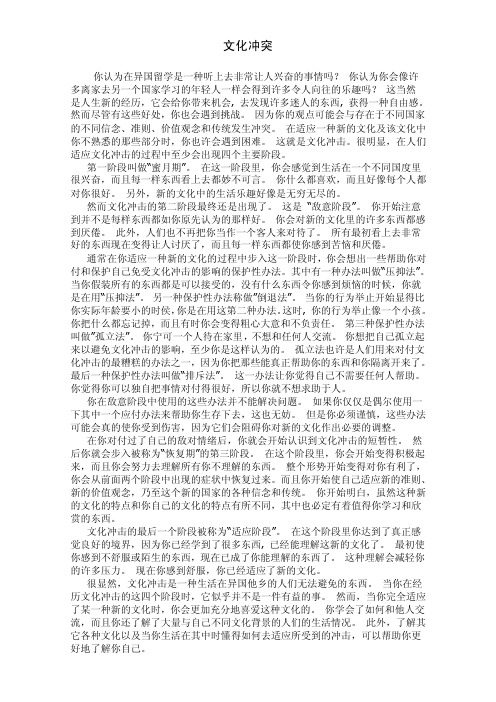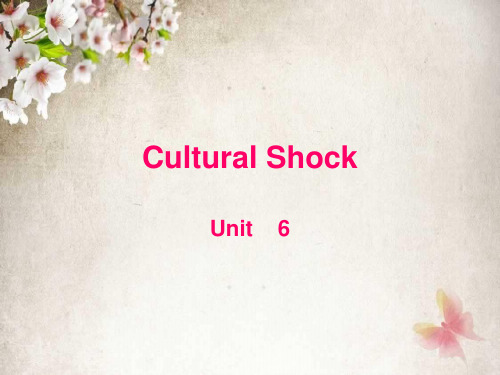Culture Shock
Unit 2 Culture Shock

Stage One: Initial Euphoria /The Honeymoon
• Arrive with great expectations and positive mind set; • Anything new is intriguing, fascinating and exciting; • Focus on similarities and how people everywhere are really very much alike; • May last from a week or two to a month or more.
Love Peter
Dear Mum and Dad, I’m really feeling fed up with my life here and longing for home. Getting anything done over here is a nightmare --- the locals are so lazy and unhelpful. And on top of all that I feel rundown and sleepy all the time, seem to have lost all my zest. Love Jim
Symptoms of Culture Shock
• Sadness, loneliness, melancholy • Preoccupation with health • Aches, pains, and allergies • Insomnia, desire to sleep too much or too little • Changes in temperament, depression, feeling vulnerable, feeling powerless • Anger, irritability, resentment, unwillingness to interact with others • Identifying with the old culture or idealizing the old country • Loss of identity •Trying too hard to absorb everything in the new culture or country ; •Unable to solve simple problems ; •Lack of confidence •Feelings of inadequacy or insecurity •Developing stereotypes about the new culture •Developing obsessions such as overcleanliness •Longing for family Feelings of being lost, overlooked, exploited or abused
英语Culture_shock课件ppt课件

• 点评:这图是说我们中国人喜欢尝试新事 物吗,老外则与新事物保持一定的距离? 如果是这样的话,我想,还是那四个字: 不敢苟同。其实,中国人在对待新事物上 面,还是(我认为)非常保守的。
11、胃痛时的饮品
• 点评:我们中国人最讲究的不一定是科学, 而是老祖宗传下来的话。那就是胃痛时要 至少喝点热的。至于为什么?那得问我们 的中医去。他们的学问,那真是“话到嘴 边留半句”,深奥着呢。
12、旅游时
• 评:其实,这有些冤枉我们中国人。毕竟 我们中国人才富裕起来几年啊,终于可以 像小日本儿那样了,走到哪里都拍照了。 另外,中国人喜欢的不是思考生命的意义, 而是“到此一游”的意义。毕竟,有照片 可以说明俺老兄到过什么什么地方了。尤 其是去了国外,则更是要用照片说明。
1、表达个人观点时
• 点评:中国人在表达个人观点时,总喜欢拐弯抹 角。“是”时不说“是”,却说“不是”。“不 是”时不说“不是”,却总说“是”。生活中发 生的实际状况。并且,最有趣的是,一个中国人 如果像那老外那样直来直去地说出自己的观点的 话(如上图所示),则会被认为“没有城府”, 属于“直肠子”,是要吃亏的。事实上,中国人 的处事哲学中最重要的一点就是“话到嘴边留半 句”。因此,在老外眼中来看,中国人表达意思 时,总令他们费解。
9、聚会
• 点评:老外永远不会明白为什么中国人那 么喜欢过春节了,也永远闹不明白为什么 中国话里的“团圆”代表着多么深厚的文 化意涵。说他们没文化,我举双手赞成。 而他们却永远是在我们过团团圆圆的节日 聚会时,一个人跑到什么地方去感受一下 什么“生命的意义”去了。看看那巨大的 “圆”,这不正是一个最好的中国文化 “图腾”吗?我们中国人要什么?不就是 要个团圆么!
18、洗澡时间
• 点评:一看这老外就不太懂中国人的生活 习惯。要知道,晚上洗澡之后再睡觉,那 是一件多么愉悦的事情。而你老外白天当 不当正不正地洗哪门子澡呢。不懂生活。 另外,咱们中国人还有大多数的农民,他 们的洗澡时间,我想,绝对不是你老外能 弄明白的,小样。
Culture Shock 文化冲击

Culture Shock①DEFINING CULTURE SHOCK 定义Culture shock is a mental state(心理状态)that comes from the transition that occurs when you go from a familiar environment to an unfamiliar one and find that your old, established patterns of behavior are ineffective.culture shock can cause you to feel “out of sorts,”“fatigued(疲劳)” and “not wholly (完全的,全部的)in the moment.”②REACTIONS TO CULTURE SHOCK 反应prepared when you experience some of these reactions• Antagonism(对抗)toward the new environment• A sense of disorientation(方向,障碍,迷惑)• Feelings of rejection(拒绝)• Upset stomach and headaches• Homesickness• Missing friends and family• Feeling a loss of status and influence• Withdrawal(撤退)• Perceiving(感觉)members of the host culture to be insensitive(感觉迟钝,不友好)③THE STAGES OF CULTURE SHOCK (THE U-CURVE) (过程,步骤) You should view the stages as a U-shaped curve. “The U-curve depicts the initial optimism(乐观,乐观主义)and elation(兴高采烈,欢欣鼓舞) in the host culture, the subsequent dip(向下再向上)in the level of adaptation, and the following gradual recovery.Excitement Phase.The first phase, visualized(在脑海中使形象化,设想,想像)as the top of the left side of the U-curve(U曲线), is usually filled with excitement, hopefulness, as the individual anticipatesbeing exposed to a new culture.Disenchantment(觉醒,清醒)Phase.This second phase begins when you recognize the reality of the new setting and some initial problems begin to develop.The second phase is a period when difficulties of language, inadequate schools for the children, poor housing, crowded transportation, chaotic shopping, and the like begintaking their toll.Beginning Resolution Phase.The third phase is characterized by gaining some understanding of the new culture. Here the person is gradually making some adjustments and modifications in how he or she is coping with the new culture. Events and people now seem much more predictable and less stressful. Effective Functioning Phase.In this final phase, at the top of the right side of the U-curve, the person now understands the key elements of the new culture (values, special customs, beliefs, communication patterns, etc.). One’s ability to live and function within two cultures (the old and the new) is frequently accompanied(陪伴)by feelings of elation and satisfaction.When this happens, the returnee experiences the same four phases of adjustment we discussed in the U-curve. This gives rise to the term “W-curve,” because it joins two U-curves together.④THE LESSONS OF CULTURE SHOCKOur discussion of culture shock was predicated on two premises.F irst, each year millions of people go abroad to work, travel, and study.Second, many of those experiences end up producing stress, homesickness, and confusion.A lthough we have placed the topic of culture shock under the category of “problems,” we would be remiss if we concluded our discussion without emphasizing the idea that culture shock can be an explicit learning experience.E xperiencing culture shock has a strong potential to make people bemulticulturalBeyond Culture ShockN ewcomers may not be ready to learn and practice social behaviors appropriate to the new culture in the initial period of settlement. It is not unusual for recent arrivals 。
Unit2_Culture_Shock_1文化冲击解析

Hospitality
What’s the problem?
The Chinese student felt disappointed at British hospitality because she used the Chinese way of showing hospitality to judge the British one. If the story taking place in China, the westerner couldn't imagine that there should be sixteen dishes prepared for her. When she ate from the eight cold dishes, she couldn't eat anymore. It is because a Western meal normally severs one main course plus a starter and sweets or desserts. The fact is that different people in the world show their different hospitality in different ways.
ቤተ መጻሕፍቲ ባይዱ
Politeness
Politeness refers to the consideration for others, tact, and observance of accepted social usage. 礼貌指的是为他人着 想、老练、遵守被 接受的社会规范。
Politeness
Some Chinese Students’ Views on Western Politeness: Foreigners never pretend to be modest. They just tell others what they think. If a Chinese person is faced with the same situation, maybe he or she would say, “ I'm sorry. The restaurant is a little bit small and the dishes are just so-so, but I hope you'll enjoy yourself.” When guests are to leave, the foreign hosts don't accompany guests to the gate upon leaving-taking. This happens because the foreigners are simply following their own cultural customs. If a Chinese host does like this, he will be considered a person with bad manners or no training and education.
Unit2_Culture_Shock_1文化冲击

Case studies
The Key to the Question: Guests to a Chinese family will never be allowed to do any housework. This is one of the ways the host and hostess show their hospitality. Even if the guests offer to cook a dish, the host or the hostess should stay around them and offer help whenever can. It is even harder to imagine that they would let their guests clear the table and do the dishes, though the guests should always volunteer help. Shao Bin’s meal at a British family sets a great contrast to her Chinese experience. This is why Shao Bin got angry. What she should do is to avoid a hasty conclusion. She should first observe the situation without judgment. And then analyze the situation using what she knows about the differences between Chinese and British culture.
CultureShock(翻译)

文化冲突你认为在异国留学是一种听上去非常让人兴奋的事情吗?你认为你会像许多离家去另一个国家学习的年轻人一样会得到许多令人向往的乐趣吗?这当然是人生新的经历,它会给你带来机会, 去发现许多迷人的东西, 获得一种自由感。
然而尽管有这些好处,你也会遇到挑战。
因为你的观点可能会与存在于不同国家的不同信念、准则、价值观念和传统发生冲突。
在适应一种新的文化及该文化中你不熟悉的那些部分时,你也许会遇到困难。
这就是文化冲击。
很明显,在人们适应文化冲击的过程中至少会出现四个主要阶段。
第一阶段叫做“蜜月期”。
在这一阶段里,你会感觉到生活在一个不同国度里很兴奋,而且每一样东西看上去都妙不可言。
你什么都喜欢,而且好像每个人都对你很好。
另外,新的文化中的生活乐趣好像是无穷无尽的。
然而文化冲击的第二阶段最终还是出现了。
这是“敌意阶段”。
你开始注意到并不是每样东西都如你原先认为的那样好。
你会对新的文化里的许多东西都感到厌倦。
此外,人们也不再把你当作一个客人来对待了。
所有最初看上去非常好的东西现在变得让人讨厌了,而且每一样东西都使你感到苦恼和厌倦。
通常在你适应一种新的文化的过程中步入这一阶段时,你会想出一些帮助你对付和保护自己免受文化冲击的影响的保护性办法。
其中有一种办法叫做“压抑法”。
当你假装所有的东西都是可以接受的,没有什么东西令你感到烦恼的时候,你就是在用“压抑法”。
另一种保护性办法称做”倒退法”。
当你的行为举止开始显得比你实际年龄要小的时侯,你是在用这第二种办法。
这时, 你的行为举止像一个小孩。
你把什么都忘记掉,而且有时你会变得粗心大意和不负责任。
第三种保护性办法叫做”孤立法”。
你宁可一个人待在家里,不想和任何人交流。
你想把自己孤立起来以避免文化冲击的影响,至少你是这样认为的。
孤立法也许是人们用来对付文化冲击的最糟糕的办法之一,因为你把那些能真正帮助你的东西和你隔离开来了。
最后一种保护性办法叫做“排斥法”。
这一办法让你觉得自己不需要任何人帮助。
文化休克名词解释题

文化休克名词解释题一、定义文化休克(Culture Shock)是指个体或群体在进入一个新的文化环境时,由于无法适应新的文化习俗、价值观、行为方式等,而产生的心理和生理上的不适应、困惑、焦虑、恐惧等负面情绪和反应。
二、原因文化休克的原因主要在于个体或群体在面对新的文化环境时,缺乏必要的心理准备和适应能力。
这可能是由于缺乏对目标文化的了解和认识,或者是因为原有的文化价值观和行为方式与目标文化存在较大的差异。
三、症状文化休克的症状可能因人而异,但通常包括以下几个方面:情绪波动、易怒、抑郁、焦虑、孤独感、失落感、思乡等。
在生理上,可能会出现失眠、食欲不振、疲劳等症状。
四、影响文化休克可能会对个体或群体的身心健康产生负面影响,降低生活和工作效率。
如果不能及时适应新的文化环境,还可能导致人际关系的紧张和冲突,影响跨文化交流和合作。
五、应对方法应对文化休克的方法包括以下几个方面:1.保持积极心态:认识到文化休克是一种正常现象,保持积极心态是应对的关键。
2.学习目标文化:了解和认识目标文化的价值观、习俗、行为方式等,有助于更好地适应新的环境。
3.寻求支持:与家人、朋友或同事保持联系,寻求支持和帮助。
参加文化交流活动,结交新朋友。
4.放松身心:学会放松身心的方法,如冥想、瑜伽等,有助于缓解焦虑和压力。
5.寻求专业帮助:如果症状严重,可以寻求心理咨询或治疗。
六、预防措施预防文化休克的方法包括以下几个方面:1.提前了解目标文化:在前往新的文化环境之前,提前了解目标文化的习俗、价值观、行为方式等,做好心理准备。
2.提高适应能力:通过学习和实践,提高个体或群体的适应能力。
这包括学习语言、了解当地文化习俗、提高沟通技巧等。
3.保持积极心态:在面对新的文化环境时,保持积极心态,不轻易放弃和抱怨。
学会欣赏和尊重目标文化的特点。
4.寻求帮助和支持:在遇到困难时,及时寻求帮助和支持。
与当地人交流,了解当地的文化和生活方式。
七、文化适应过程文化适应过程是指个体或群体在面对新的文化环境时,逐渐适应和融入的过程。
Unit 6-Cultural Shock 文化冲击

Cultural Difference
Cultural Difference
Cultural Difference
Cultural Difference
Cultural Shock
The "Honeymoon Phase"
During this period the differences between the old and new culture are seen in a romantic light, wonderful and new. For example, in moving to a new country, an individual might love the new foods, the pace of the life, the people's habits, the buildings and so on.
父母的支持
驾照
路考
签发
着迷的
Global Understanding
- 1、下载文档前请自行甄别文档内容的完整性,平台不提供额外的编辑、内容补充、找答案等附加服务。
- 2、"仅部分预览"的文档,不可在线预览部分如存在完整性等问题,可反馈申请退款(可完整预览的文档不适用该条件!)。
- 3、如文档侵犯您的权益,请联系客服反馈,我们会尽快为您处理(人工客服工作时间:9:00-18:30)。
When I changed schools, I felt like a “fish out of water”. I had no friends, and I had no idea where my classes were.
What is a “fish out of water”?
Stage 2: “Emptiness / Rejection Phase”
After some excitement, why do you think a person may feel “sad” after the “honeymoon” phase
Stage 2: “Emptiness / Rejection Phase”
When I first came to Vietnam, I didn’t know anything. I was a fish out of water. After a few weeks though, I felt more comfortable in the country.
Example 2:
Stage 4: The “Assimilation / Complete” Phase
• 8-12 months…. after moving to a new country.
How do you think people feel after living about a year in a new country?
• They begin to enjoy / live in a new culture (not just travel)
- after being sad, people start to accept their new country. They start to find their favorite places to visit, favorite restaurants, and meet new friends.
• newcomers experience problems with accommodation, transportation, shopping & communication.
• May start to miss home, family, friends, your country’s food…
After living abroad for at least a year…. what do you think happens when people return to their home country after so much time away?
Stage 5: “Reverse” Culture Shock!
Stage 1: “The Honeymoon Phase”
When people move abroad to live, how do you think they feel during the “Honeymoon” phase?
Stage 1: “The Honeymoon Phase”
Stage 3: The “Conformist” phase
“To Conform” to a new culture means to do what….?
Stage 3: The “Conformist” phase
• “To Conform” means to ‘be similar to…’, When newcomers go abroad a conform to a new culture, that means they understand and accept that their new life abroad.
you arrive?
language
Food
Transportation
Directions
ห้องสมุดไป่ตู้
School system
Student Life
Supermarkets
When people move away from many of their friends and family, how do you think they feel?
Going to a new country can feel very exciting, but after some time… many people start to feel homesick.
It’s normal for people to feel “homesick” after they leave their house
Stage 4: The “Assimilation / Complete” Phase
• People in this stage are “used” to their new country, and now – they feel like everything is normal, “at home”
“A fish out of water” is usually said about someone when they feel “out of place” – or they are not in their usual environment.
Water = a fish’s home….. When it’s ‘out of water’… that means it’s not home. It’s someplace new.
Name a reason people go abroad:
People go abroad to:
Travel / Holiday Work
Study Live in a new place
If you were going to study in America next week, what are some challenges you may have when
In 1954, writer Kalervo Oberg, was the first person to use the term “Culture Shock”, and he wrote about the 5 Stages of Culture Shock
Kalervo was an Anthropologist….this job studies different people and cultures. He traveled a LOT in his life, so he knew a lot about feeling “Culture Shock”
• 0-6 months long (usually) • newcomers are excited, happy, & feel adventurous
Everything is new, Everything is exciting Everything is an adventure ….. but then…
• People don’t feel like the country is so “new” anymore. They are confide about directions, food, the language, their work/study…
Stage 5: “Reverse” Culture Shock!
• Person returns to their home country
• They must get used to many changes while they’ve been away. • They need to remember their “old” life again.
